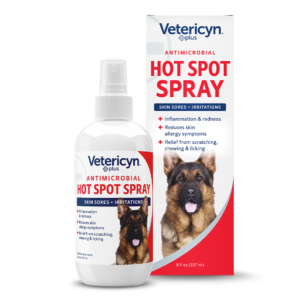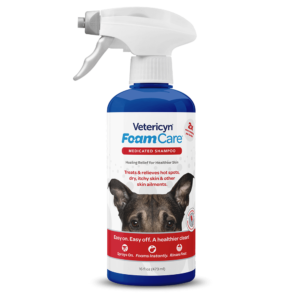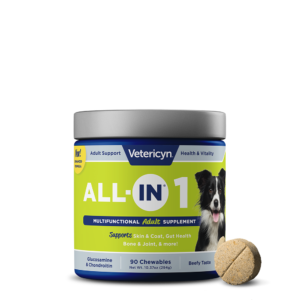Updated April 14, 2025
As a dog owner, you safeguard your fur baby’s health and well-being—including the health of their skin. While most dogs have a shiny, lustrous coat and soft, smooth skin underneath, you may occasionally notice dry, flaky, crusty, and scabbed skin when you reach down to pet your four-legged friend.
If you’ve noticed your dog has dry skin and scabs, we’re here to help with your dog’s skin care.
We’ll explain the allergies, genetics, infections, and parasites behind flaky, itchy, and sometimes painful skin and dish on treatments you can do at home.
Signs of Skin Trouble
When your dog’s skin is healthy, it’s usually smooth, soft, and free of irritation. But changes in appearance or behavior can signal that something’s off. Keep an eye out for these common symptoms that may indicate your dog is dealing with a skin issue:
- Crusty, dry, or oily skin patches
- Hair loss
- Inflamed ears
- Red skin patches or discrete bumps
- Scaling, flaking, and skin thickening
- Itch (scratching, chewing, and biting the skin)
Potential Causes
There are several reasons your dog might be experiencing dry, flaky skin and scabs—some are environmental, while others are internal or hereditary. Understanding the root cause is the first step toward helping your pup feel better and get their skin back to normal. Let’s take a closer look at the most common culprits.

Allergic Reactions
Environmental allergens aren’t just a human problem. Dust, pollen, and even their food could affect your dog’s skin.
An allergy-related condition called atopic dermatitis causes dry, flaky, and itchy skin.1 It’s often a guessing game for dog owners to figure out what’s causing allergies. If you’re interested in finding a conclusive answer, visit your veterinarian for allergy testing.
Genetic Skin Problems
Dry skin, scabs, and other irritating symptoms may be signs of breed-related skin disorders, but these are rare.2
Different genetic skin disorders—from patches of hair loss and abnormal skin to pigmentation problems—typically appear within the first few years of your puppy’s life but can occur at any time.
Infections
Pathogens, including bacteria and fungi, can cause skin-related side effects and may also be associated with more significant health issues.
Common causes of dog skin infections include:
- Yeast dermatitis
- Bacteria
- Folliculitis (inflammation of the hair follicles)
- Seborrhea (skin glands overproduce oil)
- Ringworm – this is a fungus, despite its name, and is contagious to people and other pets.3
Parasites
Dry, flaky skin may be a sign of uninvited guests living on your dog’s skin and in their fur. Three parasites are likely suspects behind itchy dog skin.
- Fleas – Their saliva can cause an allergic reaction, including severe itching, scabs, red bumps, and flaking. Fleas can bite and transmit diseases to humans as well.
- Mange – Microscopic mites that cause itch, flaking, hair loss, and dandruff. They affect dogs of all ages and breeds.
- Lice – Lice feed on skin debris or blood (depending on the type) and cause scratching, matted coats, and extreme discomfort.3 Lice latch onto your dog’s fur and reproduce.
Treating Your Dog’s Skin Problems
If you’re worried about your dog’s health, it’s always best to consult your vet. Only a veterinary professional can accurately diagnose skin disorders and recommend proper treatment.
That said, your veterinarian is likely to recommend any or all the following treatments for your dog’s skin problems:
- Veterinary shampoo – For eliminating parasites, soothing symptoms, and treating various infections, veterinary medicated shampoo is one of the most recommended treatments. Consider a sprayable medicated shampoo that offers fast results for dogs with skin issues, like Vetericyn’s Medicated FoamCare Shampoo.
- Diet change – Your veterinarian may recommend switching your dog’s food if their reactions appear to be food-related. Even a simple ingredient like soy or gluten can result in irritated skin. Additionally, if your dog’s diet lacks an essential nutrient, a complete health supplement, such as Vetericyn’s ALL-IN-ONE Dog Supplement, can help alleviate skin irritation and support overall wellness.
- Medications – Depending on the cause and severity of your dog’s dry, flaky skin, antibiotics and other medications may be needed. Be sure to follow your veterinarian’s instructions. Special products from your vet will be needed for fleas and other pathogens.

No More Itchy Business
No one wants to watch their dog to scratch, paw, and wiggle around because of itchy, painful skin. Fortunately, modern veterinary science offers effective treatment. If you’re looking for solutions to help keep your dog’s skin healthy, Vetericyn is just a click away.
At Vetericyn, dog health is our priority. We’re proud to offer effective, non-toxic pet shampoo, spot treatments, wound care, and more. For over a decade, we’ve combined our love of animals with scientific research to craft safe, non-toxic animal wellness products. If you’re looking for relief for your dog’s skin condition, look no further than Vetericyn.
 Reviewed by Dr. Kathy Adamson
Reviewed by Dr. Kathy Adamson
Dr. Kathy Adamson earned her bachelor’s degree from the University of Notre Dame and her Doctor of Veterinary Medicine degree from the University of Wisconsin-Madison School of Veterinary Medicine.
She completed a one-year small animal medicine and surgery internship at the North Carolina State College of Veterinary Medicine. Alongside her studies, Kathy worked in a research lab, contributing as an author and co-author to various journal articles.
She has also pursued medical writing and editing certification through the University of Chicago Graham School. Currently, she runs KMA Veterinary & Medical Writing, a freelance medical writing company, serves as the Digital Content Manager for the Greater Chicago Area Chapter of the American Medical Writers Association, is a member of the AMWA Communications Committee, and enjoys writing about healthcare topics for people and their cherished pets.
![]() https://www.linkedin.com/in/kathyadamsondvm/
https://www.linkedin.com/in/kathyadamsondvm/
Sources:
- Diaz S. Canine Atopic Dermatitis – Integumentary System. Merck Veterinary Manual. Accessed March 25, 2025. https://www.merckvetmanual.com/integumentary-system/atopic-dermatitis/canine-atopic-dermatitis
- Moriello KA. Congenital and Inherited Skin Disorders in Dogs – Dog Owners. Merck Veterinary Manual. 2018. Accessed March 25, 2025. https://www.merckvetmanual.com/dog-owners/skin-disorders-of-dogs/congenital-and-inherited-skin-disorders-in-dogs
- Merchant SR. Ringworm (Dermatophytosis) in Dogs – Dog Owners. Merck Veterinary Manual. 2018. Accessed March 25, 2025. https://www.merckvetmanual.com/dog-owners/skin-disorders-of-dogs/ringworm-dermatophytosis-in-dogs


